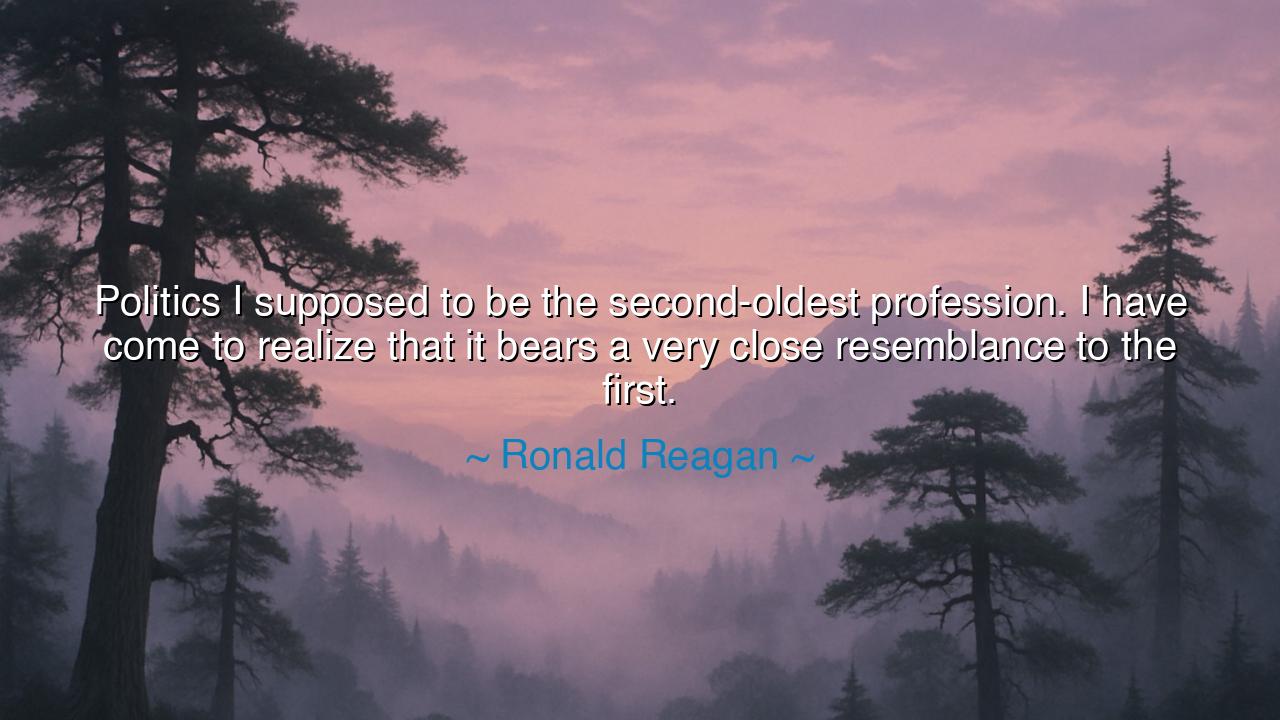
Politics I supposed to be the second-oldest profession. I have
Politics I supposed to be the second-oldest profession. I have come to realize that it bears a very close resemblance to the first.






The words of Ronald Reagan, “Politics is supposed to be the second-oldest profession. I have come to realize that it bears a very close resemblance to the first,” strike with the force of satire and sorrow. In this jest lies a grim truth: politics, which should be the noble art of guiding nations, often descends into a trade of bargaining, deception, and self-interest. By likening it to the “first profession”—prostitution—Reagan unveils the shame that comes when leaders sell principles for power, just as flesh is sold for coin.
The ancients themselves warned of this corruption. In Rome, senators were accused of selling their votes to the highest bidder, their loyalty traded like wares in the marketplace. Cicero thundered against such men, declaring that they defiled the dignity of politics by making it a trade in greed rather than a service to the commonwealth. Reagan, centuries later, merely clothed this ancient lament in biting humor, revealing that the disease of corrupted power is as old as civilization itself.
History provides us with sobering examples. In the final days of the Roman Republic, figures like Julius Caesar and Pompey forged alliances less out of loyalty to the people and more out of hunger for power. Their politics became transactions, their promises currency, and their honor the price of ambition. The Republic collapsed not because its laws were weak, but because its leaders treated governance as a commodity, bearing out Reagan’s comparison in blood and ruin.
Yet his words are not only accusation, but warning. If politics becomes mere transaction, if leaders abandon service for gain, then the people themselves will lose faith, and democracy will rot from within. To mock the corruption is to expose it, but to endure it without change is to surrender the hope of righteous governance. The jest conceals a call to vigilance: that the people must demand integrity, lest their rulers barter away their future.
Let the generations remember: politics at its highest is the art of justice, but at its lowest it becomes the selling of principles. Reagan’s bitter humor endures because it unmasks the temptations that have shadowed every state and every age. To restore politics to its nobility, men must resist the urge to trade conscience for advantage. For power is fleeting, but honor—if guarded—endures beyond the ages.






GDGold D.dragon
Reagan's comparison here strikes me as both harsh and insightful. It seems like he's suggesting that both professions, the oldest and the second-oldest, thrive on a similar dynamic. But does this analogy undermine the role of politics in shaping society for the better? Is it possible that politics, despite its flaws, is still vital for the progress of society? Or does Reagan’s comment reveal something darker about the realities of governance?
NYNhi Yen
It’s fascinating that Reagan would make this comparison, especially considering the role he played in politics. This quote seems to almost undermine the ideal of politics as a noble endeavor. What do you think? Can you really separate the concept of power and influence from personal interests? Can politics ever truly be altruistic, or does this quote reflect an unavoidable truth about human nature?
THNguyen thuy hang
I always find it interesting when political figures reflect on the state of politics in such a blunt way. Reagan’s words kind of suggest that the world of politics can be corrupt, with similar motivations to something less savory. But does it mean that all politicians are corrupt or that the system itself is inherently flawed? Is it possible to have a genuinely ethical politician in such an environment, or is that ideal just unrealistic?
UMKim Uyen My
This quote really makes you think about the nature of politics. It almost feels like Ronald Reagan is hinting that politics can sometimes be driven by self-interest and manipulation, much like the oldest profession. Is this a critique of the political world, or is he just commenting on the human nature behind it? What do you think? Do you agree that there's a parallel between the two professions, or do you feel it’s more of a cynical observation about society in general?